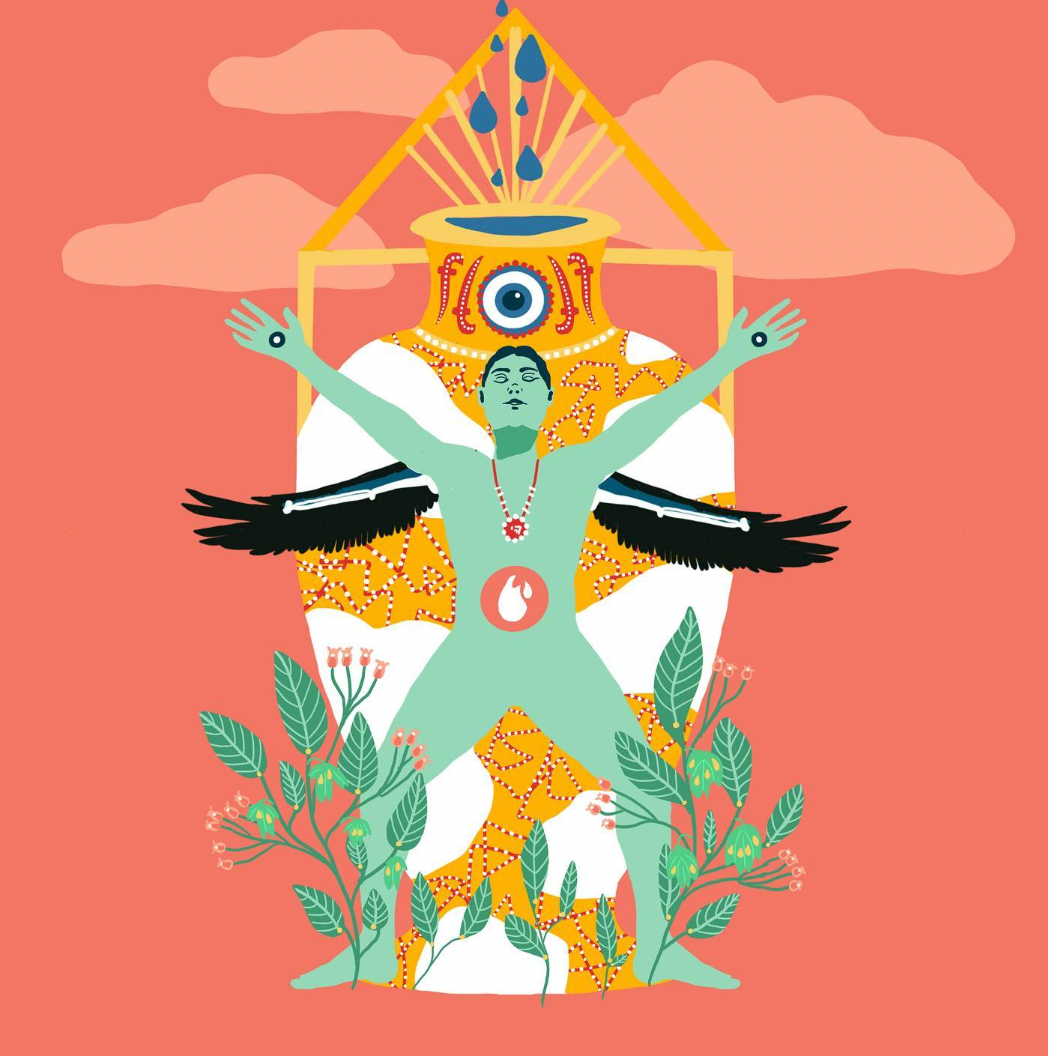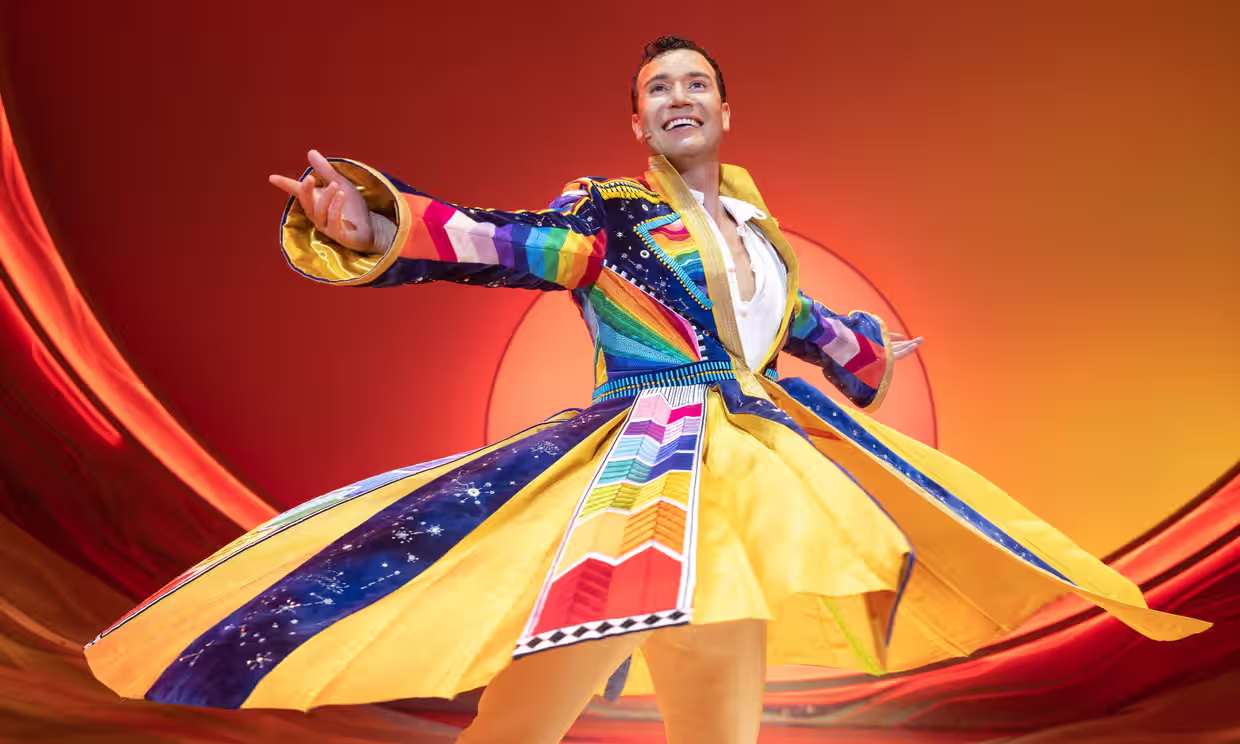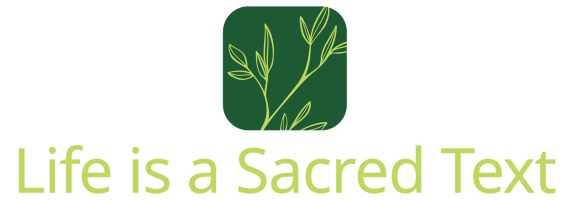Unproductive Desires
On "Crushed Testes," Transition, Jewish Continuity, and Who's Allowed in God's Community. A Guest Post by by Lexi Kohanski
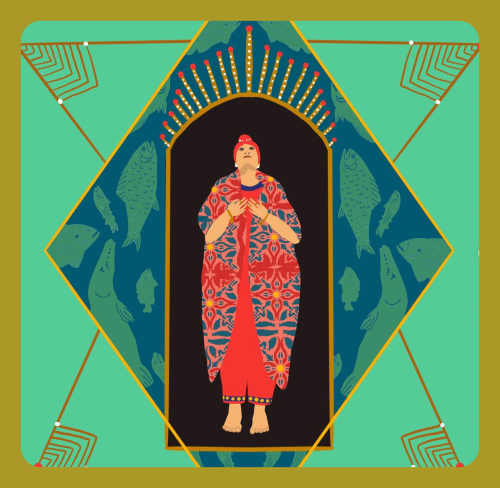
This is Life as a Sacred Text 🌱, an everybody-celebrating, justice-centered voyage into ancient stories that can illuminate our own lives. It‘s run on a nonprofit, so it’s 100% NAZI FREE. More about the project here, and to subscribe, go here:
It's my honor to present this powerful, important piece today by the extraordinary Torah teacher Lexi Kohanski. It will become, I hope, taught anytime Deuteronomy 23:2 comes anywhere near the conversation, as well as on many other occasions.
(Parts of it are... provocative. Keep reading. Strive to understand what she's really saying, and what she's not.)
Trigger warning: This deals with the verse about "crushed testes" in Deuteronomy, and though it is not graphic, I'm told it can be triggering to some people who might have had to experience, for example, chemical castration due to medical treatment. Your mileage may vary; as always, please take care of yourself. ❤️🩹
If you'd like to hear Lexi reading the piece herself on her podcast, T4Torah, you can do so at this button, below:
I, Alexandra Kohanski, hereby consent of my own free will to be sterilized by a method called Bilateral Orchiectomy.
It’s 2023. The man who will perform my bottom surgery asks me to wait in another room while they prepare the form. It’s something I need to sign as a formality, he tells me, and I don’t think anything of it. Even when the nurse brings in this form and apologizes for its “outdated language,” it still sounds like business as usual with trans healthcare. Misgendering is a daily sacrifice in the temples of medical bureaucracy. The form’s title, though, freezes my pen on the signature line: STERILIZATION CONSENT FORM.
A quick note on the history of this form. It arose from a pattern of coerced sterilizations on working-class women of color in the 60s and 70s. While these women were giving birth, doctors would pressure them into having tubal ligations–a eugenics of race and class. The Sterilization Consent Form, which requires 30 days to elapse before any such procedure, was meant to protect people from abuse.
But when I sign the form, I don’t know any of that. When the nurse called the form outdated, I assumed she meant that the focus on sterilization might offend or upset me. And it did upset me. Here were my gender desires, framed in direct opposition to my desire for children: Be myself, or be a parent. It was way too much to process–I just signed the form.
I was told about those temporary methods of birth control that are available and could be provided to me which will allow me to bear or father a child in the future. I have rejected these alternatives and chosen to be sterilized.
The choice I made not to have biological children is so overloaded with raw, unprocessed significance that it feels impossible to talk about it. Not only do I not know where to begin, but I don’t want to begin in the first place. I even have a literal scar from this surgery, stark and angry from a complicated recovery, that I’d rather mess around with than touch this question. So I begrudgingly acknowledge it as a gift that the Torah demands our engagement on topics that are incomprehensibly large, beyond us, easier left untouched–and it’s a second gift that Torah on those topics gives us places to start.
Unfortunately for me, Torah’s entry point on sterilization and reproduction is rough. I’ll spare you the verse’s context, but I won’t get around the verse itself:
לֹֽא־יָבֹ֧א פְצֽוּעַ־דַּכָּ֛א וּכְר֥וּת שָׁפְכָ֖ה בִּקְהַ֥ל ה׳׃
No one with crushed testes or a severed penis shall enter into the community of God. (Deuteronomy 23:2)
This sounds bad. The way the Rabbis understand this verse makes it both better and worse.* Worse, because they extend the kind of genital damage under discussion to anything that prevents you from having children–in other words, any sort of permanent sterilization, like my orchiectomy. Better, though, because what happens to a person with this kind of sterilizing situation is not actually exile from God’s community–it’s that you can’t get married. No shot at kids? Then no life partner for me.
*Rabbi Meir Leibush ben Yehiel Michel Wisser (Malbim) summarizes the Rabbinic interpretation in his comment on Deuteronomy 23:2:“Since the verse is speaking about a Jew, how can it say that he shall not enter–hasn’t he already entered?! From this we learn a general category: any time it says ‘shall not enter into the community,’ the meaning is not that he should not keep the commandments. Rather, it means that he shall not marry a Jewish woman. And the reason for the matter is that, since his genitals have been damaged by an act that renders him unfit to father children, he is therefore forbidden to Jewish women…”
Okay, strictly speaking, this prohibition doesn’t apply to me. The technical parameters are, roughly, that a man does something in the course of life to get sterilized. Not being a man, I’m off the Jewish legal hook. Here’s the thing, though, about loving the Torah–it’s not really about the legal bottom line, it’s about the conversation that happens when we raise the question. The final analysis matters–I got the surgery–but the point is the process. And this prohibition’s process goes through me. I went way beyond crushing my testes–I had them cut out and dissected by a medical examiner, and right in front of me there’s a signed form directly linking that choice to a sterile, childless future. I may not have violated this commandment on the technicality of my gender, but the punishment was something I signed onto in plain English.
I UNDERSTAND THAT THE STERILIZATION MUST BE CONSIDERED PERMANENT AND NOT REVERSIBLE. I HAVE DECIDED THAT I DO NOT WANT TO BECOME PREGNANT, BEAR CHILDREN OR FATHER CHILDREN.
Why do the Rabbis look at the words “God’s community” and decide that it must mean marriage, with its implicit promise of children? This prohibition only extends to marriages between a sterilized man and a woman who’s born Jewish, not to anyone who’s converted (or to now-Jewish freed slaves), so the twined threads of sterilization and eugenics show up on the rabbinic side of the tapestry, too. In any case, what’s community got to do with kids?
When you join the House of Study or support Life is a Sacred Text at another paid tier, you enable amazing guest posts like this--
as well as helping independent Torah to continue at a time when billionaires' agendas drive the broader media narrative:
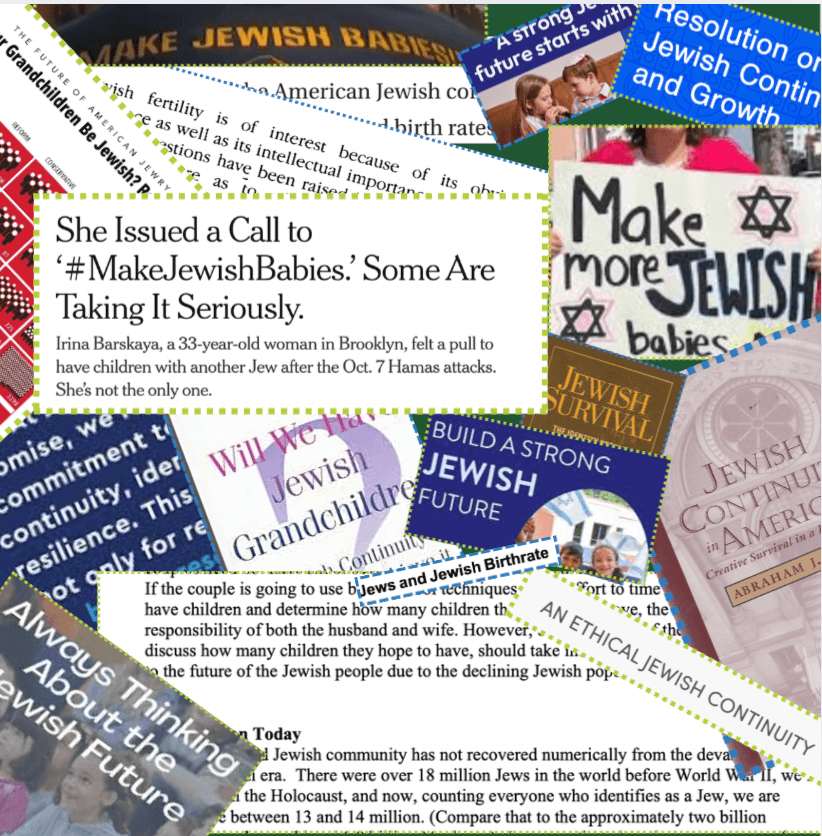
One phrase comes to my mind that makes the connection: childless cat ladies. There’s a worldview out there called Replacement Theory. As Vox reporter Fabiola Cineas puts it, Replacement Theory is
“the racist conspiracy theory that holds that, through immigration, interracial marriage, integration, and violence, and at the behest of secret forces orchestrated by ‘global elites’...or Jews, white people are being disenfranchised, disempowered, and pushed out of ‘white nations.’”
During the 2024 election, future vice president JD Vance brought one specific aspect of this flavor of white supremacy to the forefront of public discourse:
“When you go to the polls in this country, as a parent, you should have more power, you should have more of an ability to speak your voice in our democratic republic than people who don't have kids... If you don't have as much of an investment in the future of this country, maybe you shouldn't get nearly the same voice. Now people will say...well doesn't this mean that non-parents don't have as much of a voice as parents? Doesn't this mean that parents get a bigger say in how our democracy functions? Yes, absolutely.”
He’s saying that childless adults are not fully part of the project of society. If we’ve “chosen” not to participate, then we deserve to get marginalized. Note that he belongs to the administration that on day one declared in an executive order defining trans people out of existence that “‘Female’ means a person belonging, at conception, to the sex that produces the large reproductive cell” in an effort to “enforce all sex-protective laws.” Being a full member of this society requires your reproduction, and society must protect the kind of sex that produces–which is the kind of sex that my surgery meant I would never have.
In the reproductive sense, Great Replacement theory has many notes in harmony with the push to “rebuild the 6 million,” to have as many good Jewish babies as possible to ensure a supposedly secure Jewish future. The logic goes something like this: We must make sure–at any cost–that our members reproduce, so that we can continue to exist. Sounds fair enough, until you realize that while a person’s existence may be self-justified, a society’s existence is not. If the ultimate purpose of the project of Judaism is to keep on making more Jews–or if the point of the United States is to keep on making more white Christians–then those projects are nothing more than “the ouroboros, the self-cannibalizing serpent that eats its own tail,” where the tail is made out of people, consumed and killed so that the mouth can keep eating.
Is this kind of logic underpinning the Rabbis’ reading of “shall not enter God’s community”? It’s not so far-fetched. Jewish ritual life does center marriage and children. One of our 3 wishes for a newborn is marriage, on par with Torah and good deeds; 6 of 63 tractates of Talmud explicitly focus on marriage issues. Synagogue social life is usually either for young singles or children and their parents, with nothing between or beyond. It really can be true that a single and sterile 29-year-old is less a part of her Jewish community on account of those two s-words. When I “consented of my own free will to be sterilized,” was I relegating myself to second-class citizenship? What was I thinking?
I understand that I will be sterilized by an operation known as a Bilateral Orchiectomy. The discomforts, risks and benefits associated with the operation have been explained to me. All my questions have been answered to my satisfaction.
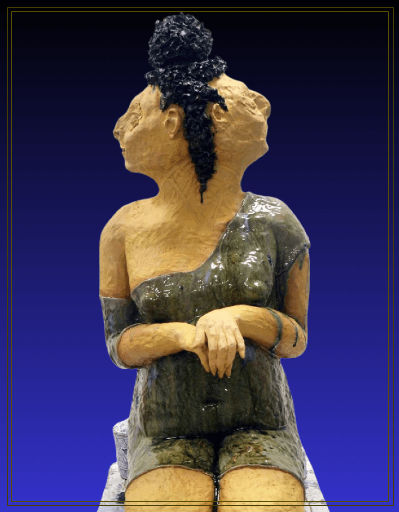
The first time I had to think about how my transition conflicted with my desire to have children was when I started HRT. Before prescribing, my NP said if there was even a chance I wanted kids, I should look into fertility preservation. I called my insurance, but they didn’t cover it for this kind of “voluntary treatment.” My other options were fertility clinics featuring pictures of fathers cradling smiling infants. At the time, I didn’t know there was even a chance that HRT wouldn’t be permanently sterilizing. I thought this decision was final, and I chose not to put myself through fertility preservation. I told myself it was too expensive, but really it was because the idea of having my sperm sitting in a freezer waiting to impregnate someone was too dysphoric to think about. I shoved the desire for children down and told my NP to sign me up for estrogen.
Three years later I looked back on this moment and wrote that if you have to choose between the mitzvah of transition and the mitzvah of procreation, you should choose the one that’s in front of you. I did not write anything about how the loss of one mitzvah for the sake of another might affect you. I ignored the loss–it was too big to grasp anyway–and chose towards myself.
After I learned that HRT isn’t necessarily sterilizing, I told my therapist it would make me feel too horrible to conceive a child through penetrative sex–or having my semen in the picture at all. He said, based on other trans patients’ experiences, that despite a dysphoric conception I would love my child. How they got there wouldn’t matter. Maybe sometimes the final ruling really is all that counts, but that option still wasn’t available to me, and the woman inside me was demanding that I manifest her, now. It was time for bottom surgery.
When I told my father about my surgical plans, he admonished me that I need to find a life partner. It was like he was channeling the verse: don’t sterilize yourself, Lexi–don’t you want to get married? But my dad wasn’t making a legal proclamation like the Torah, or a moral and political condemnation like Vance. I heard in his words an implication that the surgery would make me undesirable, a Frankenstein’s monster fit only for other freaks like me, if that. If I sterilized myself for the sake of my gender, I wouldn’t be able to find anyone to marry.
I did not react coldly to Dad’s admonition–in fact, I broke down crying. I said that’s why I was moving to New York, to have a better chance of finding a partner. Of course I wanted children, of course I wanted love. I never cried so hard in front of my father, before or since–so hard that it reached across the Zoom screen and made him start crying too. I took his comment so badly, probably because I believed what I thought he was implying: that choosing towards my womanhood meant no one would want me.
I have asked for and received information about sterilization from the doctor. When I asked for the information, I was told that the decision to be sterilized is completely up to me.
There’s a scene in The Poppy War by R. F. Kuang where the main character, Rin, takes what the Rabbis would call a “cup of castration” so she wouldn’t be dragged down in her elite military training by her painful menstrual periods. People took this scene as a stark example of female empowerment, but Kuang meant Rin’s choice to be problematic. The adults responsible for Rin encouraged her to take the most extreme way out, in order to build her into a perfect soldier. It turns out later that her decision means that she and her male counterpart will be the last of their race. It’s a complex moment: Rin chose herself, and she also chose towards a system that wanted to use her. So what’s the system in which I made my choice?
The Torah tells me that–insofar as it’s about sterilization–my transition is happening in the context of “God’s community,” which to hear the Rabbis tell it is a communal system about marriage and children. Almost ten years ago I read a story about someone called “the true child” that’s been sitting with me for just this moment:
One Shabbat, after the third meal, [the Jew of Pshiskhe] averted his face, and in a voice echoing his distress, addressed his guests: “Tomorrow you will be going back to work—and you work hard, I know. If I asked you why you work so hard, you would tell me that it is not for your sake, but for the sake of your children; that you wish them to grow up to be good Jews, loving [humankind] and fearing God. Yes, that is what you would tell me. That is what, for thousands of years, [people have] been saying in every language. [People] work and work, never for [themselves] but always for [their] child, who in turn will work for [theirs] . . . As for me, I am waiting . . .” He paused, before continuing even more sadly: “I am waiting for the true child.” (Elie Wiesel, Souls on Fire, “The School of Pshiskhe”)
Wiesel explains what the Jew of Pshiskhe meant by “true child:” Whom did he mean? The Messiah? Perhaps. But it is also possible he simply meant the father who would admit in all honesty that he was working for himself. I think Wiesel is wrong. The Jew of Pshiskhe was not talking about any father, honest or otherwise–he was talking about someone who, in the face of the world’s systems and their superhuman pressures, remains as true to their holy desires as a child. They do not give in to the ouroboros of re/production; they will not sacrifice their inner light on the altar of mere continuity.
It’s no coincidence that the Jew said this on Shabbat, the weekly break from work–the true child does not labor or reproduce for the sake of production. In workaday life, we labor for the sake of our children, who will labor for their children, no one ever standing up for their irrational inner child. I rejected this system. Instead, at age 25 I chose to upend my life for the sake of a girl whose childhood never happened; I acted in the memory of desires so nonsensical that they were barely real. I centered my world around the unproductive desire to transition, a desire that served no interests except for the hazy dream of a woman who didn’t exist. Hillel said it–if I am not for myself, who will be?
The love I felt–still feel–for that dream woman has no point beyond itself. It doesn’t arise from or belong to any system; it has so little grounding in reality that I often wonder if that love is what structures reality itself. My transition has taught me about this world-shaping, purposeless love. In the essay “Expressions of Love,” the author Mick suggests that historically children were brought into the world for specific purposes: an heir to the family title, someone to pass on the name, another pair of hands for the family farm–or for the master’s. And if children are born to play certain roles, their lives become failures when they do not fit those predestined purposes. Purposeless love, on the other hand, means that the beloved signifies in their own right, not as a scion or scar of the lineage. Our verse, and much of Jewish communal life, make it seem like the value of my membership in God’s community is based on producing children, with entry granted to those who can maintain the line of descent. That doesn’t sound like the community of the God I love–or the God of the prophet Isaiah:
Let not the foreigner’s child who comes to God say, “God has fully separated me from God’s people!” And let not the castrate say, “Behold, I am a withered tree!” For thus has God said to the castrates who keep My Shabbats and choose what I desire and cling to My covenant: “I shall give them in My home and within My walls agency and recognition–better than sons and daughters–everlasting recognition I shall give to the one who will not be cut off!” (Isaiah 56:3-5, my translation)
God’s own recognition to the childless castrate who will not be cut off–from their own desires, from the community of God that has nothing to do with productive families. Isaiah is speaking to the true child.
My consent expires 180 days from the date of my signature below.
I absolutely did the right thing for myself by getting that surgery. So why can’t I shake this shadow of regret? I feel it whenever I see parents playing with their children at kiddush, when all the shul programming is for children and their caregivers, when my friends talk about their plans for IVF or adoption. It’s like the verse is slamming its staff down in front of me and declaring: “You might pass, but you shall not enter the community!”
My best guess is that it’s not regret about the past. I chose towards myself in a way that everyone should be able to. No, it’s regret about the future, a future for myself that I don’t believe will arrive. I don’t believe that children are coming my way, even though I want them. Partly that’s because I’ve been told–by the Torah, the commentators, the right-wing eugenicists, my own loved ones–that I won’t be wanted. Those things set me up to not believe. But the actual cause of my defeatedness is that I’ve never chosen towards it. Just like with my transition, the more I drag that non-existent dream into being, the more I’ll believe that it will be real.
When you subscribe to the House of Study, you get weekly deep dives for your heart, soul and brain; Ask the Rabbi jams; monthly Zoom Salons; access to 4+ years of archives; a study partner, if you want one; and much, much more. ❤️ 🌱
And it can all happen without getting more email!
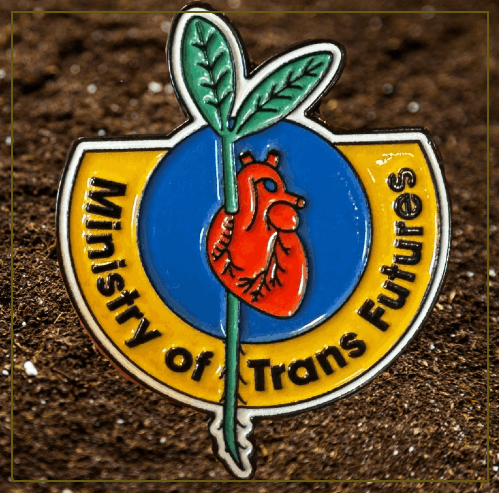
As I write this, I believe it as little as I believed six years ago that I could be a woman. And just like with my transition, I imagine I’ll need other people to believe it for me first–a community of believers. God’s community.
I have received a copy of this form. Alexandra Rose Kohanski 5/10/23
There’s another verse that constantly calls out to me:
“Go eat your food with joy, and drink your wine with a good heart, for God has already wanted your actions.” (Ecclesiastes 9:7).
I called this piece Unproductive Desires, because the yearnings that have driven me for the past 5 years have led me to giving up my ability to reproduce. But in God’s community, our actions are already wanted–the shining cores of all our desires are productive, moving us towards the community’s purpose. The more we transform into ourselves by turning our deepest desires into action, the more we know God. Each of us is already wanted. And if I haven’t yet taken steps towards children, maybe it’s because God wanted me to step into myself first.
We conclude many of our prayers with the wish כן יהי רצון, may it be Your will. But those words literally mean “May such a desire exist.”
We are not living in a system that wants queer or trans desires to exist. For all my struggles to reconcile my transition with a Jewish culture that prizes reproduction, trans people also struggle to transition in the first place. As politicians work to take away our rights, we find ourselves in a society that wants to dehumanize and eliminate us. When our survival is at stake, it can feel irresponsible to consider the spiritual fallout of gender transition. But even as we focus our efforts on defending our rights and our lives, we need to remember, constantly, why we are in this fight. We need to talk loudly about the sacredness of our desires, because what keeps us human in the face of their dehumanization is our ability to yearn. So I write and dream of God’s community, a world where we are already wanted. God wants us to make our desires real through action - that is my reason for fighting, just as it is my reason for living.
May we come to know all the desires God has given us, and may we build communities that want us to manifest every one of them, because our desires lead us to who we really are.
And who are we really, if not true children of God?
🌱 ❤️ 🌱
A reminder about the subscription model:
I want my work to be as accessible to as many people as possible, in as many ways as possible. That's why the Monday essays are free, and why we donate subscriptions to anyone for whom paying is a barrier to the House of Study posts.
I also believe people should be paid fairly for their work. Needless to say, these two values sometimes seem to be in conflict, but I do what I can to find a fair balance. I offer many resources for free, and charge for others. When you donate generously or pay at the top of our scale, that helps support the work I do, provides access for those who have fewer resources, pays for the infrastructure and the technical and practical support that it takes to do this, and helps us keep the work sustainable. ❤️ 🌱
When you sign up for the House of Study, you get deep dives every Thursday, Ask the Rabbi Q & As, monthly Zoom Salons IRL, access to over 4 years of archives, a study partner if you want one, and so much more-- and you DON'T have to get more email if you don't want! Don't you deserve all this nourishment and support??
As always, if you want in on the House of Study, but paying isn't for you right now, email support @ lifeisasacredtext.com and we'll hook you up.
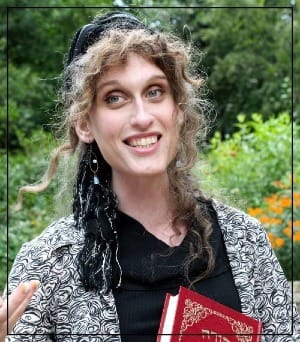
Lexi Kohanski is a trans Jewish writer and educator who focuses on empowering those who have not felt at home in Judaism. She is a leader in the realm of trans Torah, creating Torah study spaces that are intergenerational, identity-spanning, and full of joy. Her work has appeared in Gashmius Magazine, Approaching, and the Trans Halakha Project, and she regularly publishes through the T4Torah Patreon. Lexi’s cornerstone halakhic essay, Be Whole: A Halakhic Approach to Gender and Transition, lays out a pathbreaking halakhic framework for relating to Jewish gender transition as a sacred undertaking. Lexi gives regular sermons on spiritual resilience and survival through her podcast, Torah for Trans Lives. She is also the author of Worlds To Come, a first-of-its-kind tabletop roleplaying game for learning Hebrew. Before finding her calling, Lexi was an actor, ESL teacher, and farmer. Lexi’s home as an educator is at the Torah Studio, where she serves as the organization’s Director of Online Learning.

Especially without Substack's built-in network, word-of-mouth– forwarding emails, sharing on social media, passing notes in class, all of it– matters more than ever.
Please spread the word about this post and Life is a Sacred Text in general.
Thank you. 🙏 ❤️
Share this post
Support indie Torah & the commitment to telling inconvenient truths:
RELATED POSTS:
